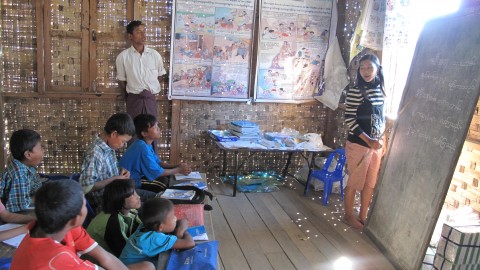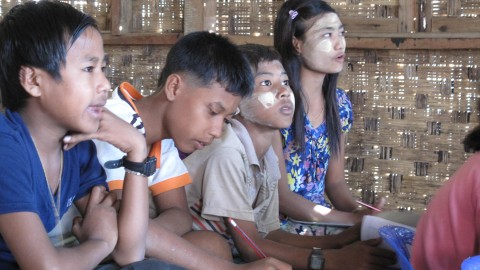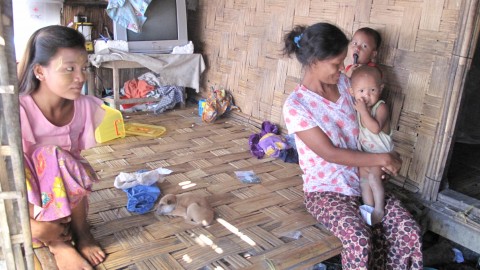Refugees in Myanmar dream of owning a house and educating their children
Myanmar’s largest city Yangon celebrates the victory of the opposition party NLD in the general election. Stands of street vendors are full of calendars and magazines plastered with photographs of opposition leader Aung San Suu Kyi. Change finally seems possible in a country that, for half a century, has been led by a military junta both officially and unofficially.
This celebration of democracy does not reach all corners of Myanmar, however. Rakhine state, located on the western coast, is the second poorest state in the country and vulnerable to natural disasters. Rakhine suffered greatly from flooding that started last June.
The region is also the scene of long lasting unrest and conflicts between different religious groups. 140,000 internally displaced people are living in Rakhine state.
“Democracy doesn’t reach here. We have lived in this camp for four years already. We have no chance of returning to our homes because the regions are occupied. We also can’t leave the camp because the land around it is owned by the government, and the government doesn’t rent us land. Still, we dream of one day being able to build our own houses outside the camp”, says Mr Kyaw Aye.
Kyaw Aye is heading the coordination committee of a refugee camp called Set Yone SU 3. The committee works with aid organisations who have funded the construction of shelters and temporary living spaces, and have supported schools, sanitation and food supply.
Finn Church Aid has assisted refugees in the camp through its partner the Lutheran World Federation. FCA has built temporary learning spaces and supported education with funding from the civil protection and humanitarian aid (ECHO) department of the European Commission.
Some women from the camp’s coordination committee are gathered around. “The most important thing we hope for our children is an education”, they say in unison.
The committee currently consists of eight women and five men.
“At first, government officials wanted to nominate all members of the committee. All of their candidates were men. We did a lot of advocacy in order to include women in the committee and we finally did it”, rejoices Ms Naing Soe Aye, a supporting worker for the committee.
Equal support to different religious groups
A primary school where children can study up to the fifth grade has been set up in the camp. Those who pass the fifth grade are given a certificate, which is recognised by the national education system.
The primary school currently has 105 pupils and four teachers.
“We are hoping to get a school where children could continue to study after the fifth grade. Currently, the only possibility is to leave the camp and walk into a secondary school in a village half an hour away. The route is dangerous, however, and we are concerned for the safety of girls in particular”, Kayaw Aye says.
The refugees living in the Set Yone Su 3 camp are Buddhist. Their situation is good compared with Muslim refugees. The Buddhist refugees are allowed to move freely outside their camp and attend state schools.
The situation in the Muslim camps is challenging and people’s movements are limited. Also, there are hundreds of thousands of Muslims living outside camps. They are forced to live in small villages in restricted areas.
Even though the situation in the region is challenging, and tensions between religious groups are high, Finn Church Aid and the Lutheran World Federation have maintained that both Buddhist and Muslim refugees are assisted equally. This approach is hailed by Deputy Director Aung Kyau Khine in Sittwe, the capital city of Rakhine state. He is working in a government office coordinating assistance work in the region.
“Some organisations have directed their assistance solely to Muslims where as others only wish to assist the Buddhists. This has further heightened tensions in the region, Aung Kyau Khine laments.
Hopes for quality education
In the Set Yone Su 3 camp, pupils study in temporary schools constructed with the support of Finn Church Aid. In addition to the primary school, another school is currently operating in the camp teaching those 11 to 17-year-olds who have never been to school or whose education has been interrupted by conflicts. The school operates in two shifts. The teachers are refugees living in the camp. Working as teachers earns them a small income.
“I have participated in two training courses, both of which lasted five days. One of them was on teaching literacy and numeracy, and the other was life skills training”, says teacher Khin Maung Cho.
The teachers themselves have little education, and teaching is based on repetition and memorisation, without a deeper understanding of the subject matters.
“We would like to develop the quality of education. Teachers ought to be offered pedagogic training. We are working with the local education office. It would help to get teachers from state schools involved in our training courses, says Ms Duangporn Saussay, education officer.
Vocational training is also organised at the camp. The first three-month-long sewing course just ended, and approximately 60 percent of graduates now earn an income by sewing. A new sewing course is about to start.
“My 16-year-old daughter was admitted to the sewing class. Earlier, she had only finished three classes of primary school”, says Than Than Nu, mother of three.
Than Than Nu lives with her family of five in a building that has eight rooms and was originally intended as a temporary dwelling. Each family has one room. A small porch gives some space to manoeuvre and the actual room can be reserved for sleeping.
“We have lived in this camp for four years. Two of my children have been born here”, Than Than Nu says.
The family children are aged 1, 2 and 16. The family has also just adopted a small puppy, which the 1-year-old Win Myint Than and 2-year-old Win Win Than eagerly pet, perhaps too roughly. Big sister Mee Pu Chay shoos her little siblings away from the dog. Life goes on in the refugee camp, revolving around mundane things.
Text and photos: Johanna Kurki
The writer is a Finn Church Aid Education Specialist currently conducting a survey on the challenges and possibilities of the Myanmar education system.


